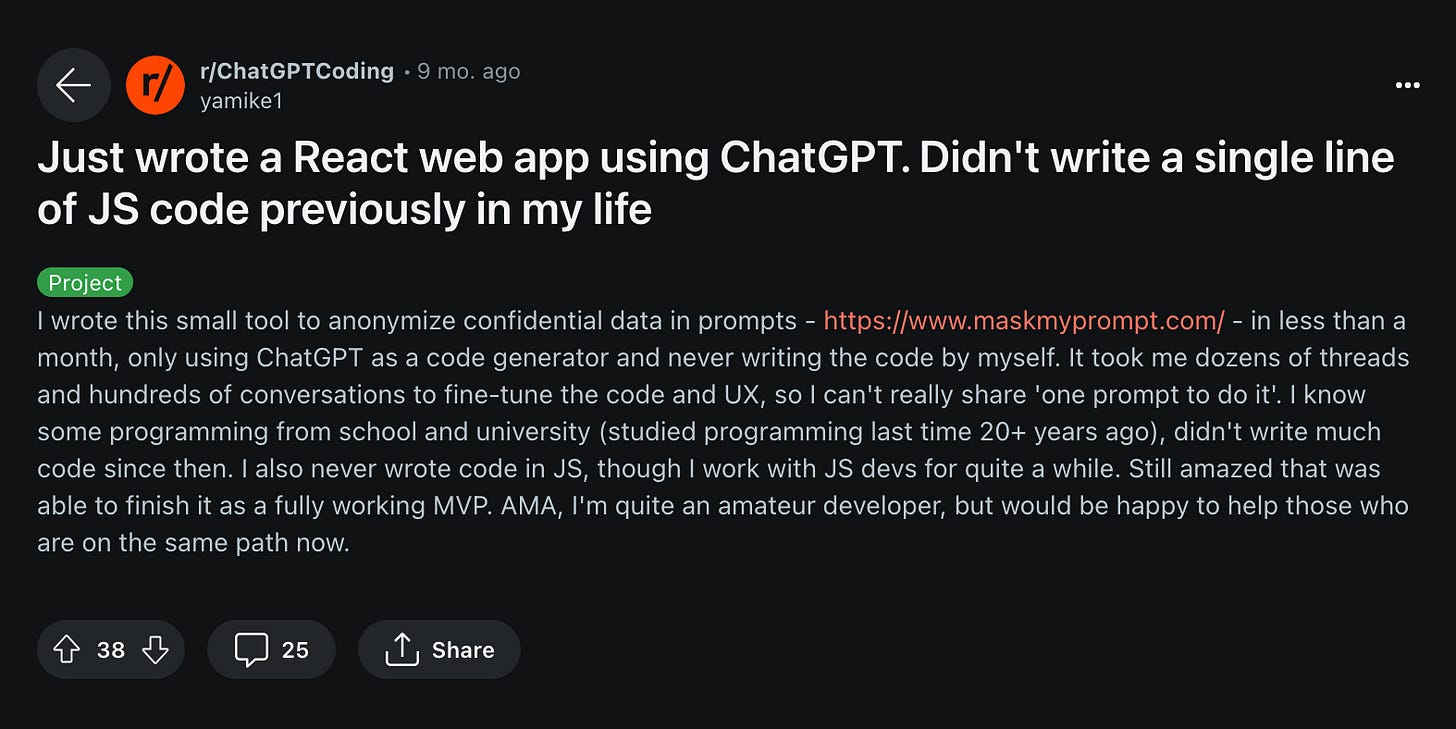Programming Prompt Engineering & Copilots
Both for Devs and Non-technical People
👋 Hey, I’m Stepan and welcome to a ✨ subscriber-only edition ✨ of Creators’ AI. By subscribing, you directly support Creators' AI's mission to deliver top AI insights & practical knowledge without ads or clutter. Your subscription allows us to grow our dedicated team and curate the most important AI Tools, Stories, and Tutorials in one place. - Stepan
Intro
Chatbots make the software development industry more accessible to everyone. On the one hand, copilots simplify the work of developers; on the other, they allow non-technical people to write code at the junior level (sometimes even middle). This makes it possible for more and more users to create monetizable apps & services.
Today, I'm offering you a breakdown of how AI is lowering the entry threshold into the development industry, what bonuses to global GDP copilots can bring (spoiler: up to $1.5 trillion!), and how we can capitalize on it right now. At the end, you'll find a tutorial on using Copilot + prompts and tips for communicating with the chatbot.
🔗 Are you already subscribed and want to ensure you don’t miss our newsletters? Move our newsletter from “Promotions” to “Primary” in your inbox! (video instructions below)
Devin Scares The Hell Out of Software Engineers
Speaking of AI tools for app development, we can't ignore the latest news. A few days ago, Cognition introduced Devin, the first AI software engineer. The company said that Devin is an agent that solves engineering tasks using its shell, code editor, and web browser. And after that, among many developers, there was... Well, panic.
Is Devin AI really that dangerous for software engineering people? Or is it just a tool, and YouTubers are making unnecessary hype about it? Let's break it down.
Devin is a new platform that develops the idea of autonomous programmer Copilot from GitHub and Microsoft. Like AI from the two companies, Devin promises a significant shift in the nascent algorithm-based coding industry as it can do all the work independently rather than just assist humans.
In an announcement video, Cognition CEO Scott Wu showed how the model would work. When Devin receives a request, it will start searching for educational content to teach it how to perform the task. The AI can debug any problems, but the user can step in to make edits if needed.
Devin has access to a code editor, browser, and shell. He can run them in an isolated environment for planning and then perform complex engineering tasks that require thousands of decisions. Of course, unlike humans, AI does all the work in a matter of minutes. Even if a human would take hours or even days to complete the process.
Keep your mailbox updated with practical knowledge & key news from the AI industry!
From the user's point of view, Devin works like a chatbot, similar to Gemini and ChatGPT. The user can describe their task in natural language, create a work plan, and delegate the entire routine to Devin. Most importantly, the new tool not only writes its own code and runs tests but also reports its progress in real time.
Actual reviews of Devin are still scarce, but some do exist. For example, Bloomberg journalist Ashlee Vance got early access to the tool and has already tested it. She said that Devin created a Pong-style video game and website for her from scratch in less than 20 minutes. Technically, this means Devin can work around the clock, but unlike a rookie developer, it doesn't require a paycheck, weekends, and lunch breaks.
Devin is currently available to a limited number of developers, and the company is accepting applications from those who want to join the beta. But that doesn't mean we have to sit back because we can create apps without programming skills right now.
Learn more about AI Automation agencies with this newsletter:
The Power of AI in Code Writing
To avoid throwing around empty statements, it's crucial to understand how algorithms can benefit you when writing code. So here are some numbers for you.
According to GitHub, in one year of operation, the model has been activated by more than one million developers and adopted by more than 20,000 organizations. The AI has generated over three billion accepted lines of code and is now the world's most widely adopted developer tool.
GitHub believes that AI could add the productivity gains of an additional 15M "effective developers" to the world's potential by 2030, adding more than $1.5 trillion to global GDP. As for the level of AI integration into the developers' work, many already use Copilot as their primary tool.
And some of them are using Copilot as their only tool.
For example, software engineer, writer, and photographer Evgeny Klimenchenko from London. A couple of years ago, he set up an experiment to develop an application from scratch using only GitHub Copilot in one week. The enthusiast created a simple random quote application displaying the quote's sentiment.
Evgeny set himself two constraints: not to use internet searches if something goes wrong and not to write the code himself. Using the Next.js and React platforms (the most convenient for working with Copilot), he built an app by passing short prompts to his chatbot. And it worked.
Talking about the results of his experiment, Evgeny admitted that he didn't have high expectations from AI, but Copilot managed to surprise the developer. Sometimes, the suggestions were so good that Evgeny couldn't believe a chatbot made them. You can read more about the engineer's experiment on the blog on LogRocket.
Eugene's cases show the process of creating applications with Copilot well, but the result may not impress as much. To show what AI can do, we found another no-code developer. Reddit user nicknamed yamike1 came up with the idea of creating a tool to anonymize confidential data in prompts. And he didn't even touch GitHub Copilot. All he needed was ChatGPT.
Creators’ AI could be a valuable gift for your friend, colleague, or family member. Gifting books is bright, but giving an AI newsletter is a superb move 😎
Why Prompt Engineering Is Important
Now, we know that some developers are afraid of code-writing chatbots. We also know that this industry is growing by leaps and bounds and is predicted to grow further by analysts. And, thanks to Eugeny and yamike1, we see that it works. But we haven't discussed another essential thing.
If you are planning to experience the capabilities of chatbots for coding, you must know that prompt engineering is the foundation. Clear, well-structured prompts lead to more accurate and relevant code suggestions and save time by minimizing the need to iterate or manually edit output. Of course, the right approach will ensure you get the desired results.









